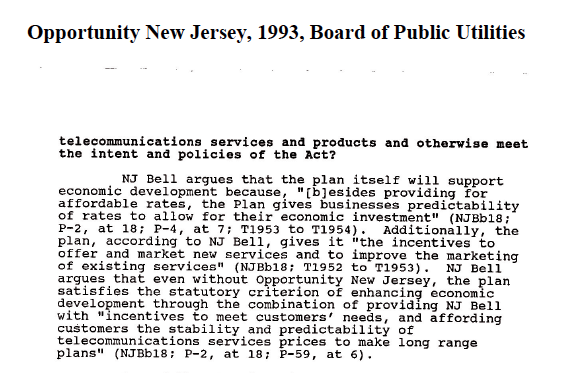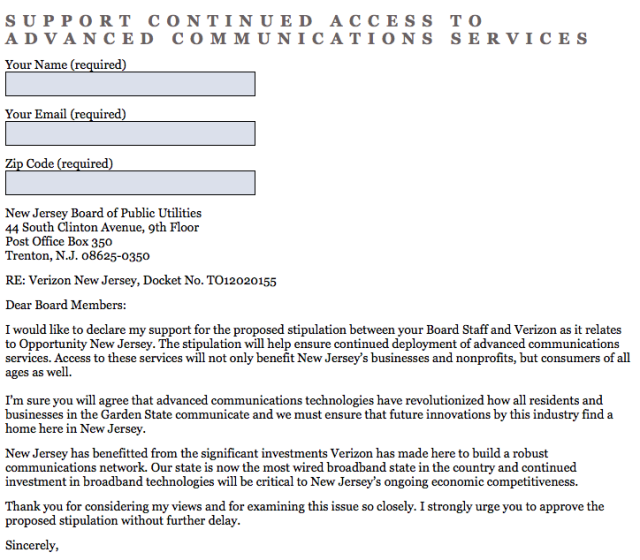
Verizon doesn't want to deploy high-speed wired broadband service to all New Jersey residents, despite receiving financial perks from the state for the past 20 years in exchange for building a statewide network.
To make sure it doesn't have to complete the buildout to all of New Jersey's 8.9 million residents, Verizon led an astroturf campaign that flooded the state Board of Public Utilities (BPU) with hundreds of identical e-mails purporting to support Verizon's case. One person who is listed as having written one of these e-mails told Ars that he didn't submit anything, and if he did, "I would've slammed them." A report in Stop the Cap this month found several other Verizon "supporters" who had no idea e-mails were submitted under their names.
Before describing the astroturf campaign, here is a little background. Verizon is on the verge of getting state approval of a settlement eliminating an obligation to provide broadband service to the whole state by 2010. Instead of just getting service automatically, people who want broadband from Verizon would have to complete a "bonafide retail request" process and prove that they and at least 34 neighbors can't get service from anyone else. Even then, Verizon would have nine months to comply and could meet its newly lessened obligation by making 4G cellular service available through its subsidiary, Verizon Wireless.Verizon predecessor New Jersey Bell agreed to the statewide broadband buildout in a 1993 agreement with the state. In exchange for a different form of price regulation that would allow the company to make more money, "Verizon agreed to upgrade its network to provide broadband to every Verizon New Jersey business and residential customer, school, and library for 100 percent of its service territory," according to the state's Division of Rate Counsel.

"Verizon New Jersey committed to have 100% of their territory rewired with a fiber optic service capable of 45Mbps in both directions and completed by 2010," according to telecom analyst Bruce Kushnick. "Known as 'Opportunity New Jersey' (ONJ), state laws were changed to give the company billions of dollars in higher phone rates and tax perks."
"We believe customers paid over $15 billion to Verizon New Jersey for these upgrades... and the money continues to be collected," Kushnick also wrote. "That's about $4,000.00-$5,000.00 per household." (Kushnick details his calculations here.)
Verizon reported $120.6 billion in revenue and $32 billion in operating income in 2013, though in New Jersey the company says it has run "annual negative net income of over $500 million in a number of recent years."
Verizon told Ars that the 1993 agreement only called for data rates up to 45Mbps and said that Verizon was allowed to reach that with DSL rather than fiber. The agreement "never dictated that a specific technology be used to meet the standard," Verizon said. The proposed rewriting of the agreement would explicitly allow wireless instead of wired broadband.
Verizon said in a filing with the state that it has "invested more than $13 billion in its wireline infrastructure in New Jersey and billions more in its wireless infrastructure." New Jersey has 3.2 million households. Verizon says its fiber-to-the-home deployment “passed 2.1 million premises” and that DSL is “available in 100 percent of Verizon central offices.”
Verizon spokesperson Lee Gierczynski told Ars that this "investment far exceeds the $5.4 billion contemplated by ONJ, all done as competition continued to erode Verizon’s wireline business and the company reported annual negative net income in recent years." Verizon "never collected excess fees or taxes or imposed surcharges for the deployment of broadband in New Jersey," Gierczynski said.
Verizon did receive "modest pricing flexibility for certain services," the spokesperson said—those would be the higher rates Kushnick referred to. However, Verizon said the 1993 agreement "also imposed a price cap on basic phone service that resulted in no increases in that service from 1985 to 2008."
“I can assure you that I did not send that response”
One of the last steps before Verizon gets state permission to eliminate its universal broadband obligation was collecting public comments. The comment period is over, but it's not clear when the board will make a decision.
To tilt the process in its favor, Verizon launched an astroturfing campaign that sent hundreds of e-mails to the state utility board.
"Dear Board Members," one such e-mail reads, continuing:
I would like to declare my support for the proposed stipulation between your Board Staff and Verizon as it relates to Opportunity New Jersey. The stipulation will help ensure continued deployment of advanced communications services. Access to these services will not only benefit New Jersey’s businesses and nonprofits, but consumers of all ages as well. I’m sure you will agree that advanced communications technologies have revolutionized how all residents and businesses in the Garden State communicate and we must ensure that future innovations by this industry find a home here in New Jersey.
New Jersey has benefitted from the significant investments Verizon has made here to build a robust communications network. Our state is now the most wired broadband state in the country and continued investment in broadband technologies will be critical to New Jersey’s ongoing economic competitiveness.
Four hundred sixty-five people sent an e-mail with that text to the state board during the comment period, with 418 of the e-mails coming in the three-day span from March 22 to March 24.
We didn't try to verify the authenticity of every e-mail, but did send messages to a couple of dozen of the sending addresses. One address turned out to be invalid. The owner of another e-mail address said he had no idea that he was listed as a supporter of the campaign.
"I am a customer only to Verizon and I was not contacted by them to submit anything," the person told Ars. "If they did, I would've slammed them. They are gougers. If AT&T was where I lived, I would switch in a heart beat."
When this customer was shown the e-mail he allegedly sent to state officials, he said, "That would mean someone did it on my behalf. I can assure you that I did not send that response."
“As a Verizon employee...”
LinkedIn searches show that some of the people sending the aforementioned e-mails are Verizon employees, with titles such as "field tech" or "sourcing process leader."
Those e-mails didn't identify the writers as Verizon employees, but a second form letter did identify all of its senders as employees. It reads as follows:
As a New Jersey resident and Verizon employee, I am expressing my support for the proposed stipulation between BPU Staff and Verizon. The proposed stipulation is fair and balanced and, under your guidance, will build on the success that the Board and Verizon have achieved in making the Garden State one of the most wired broadband states in the country.
Access to advanced communications technologies is no longer a luxury; it's a necessity. Thanks to Verizon, New Jersey consumers and businesses can harness the power of these technologies like never before. By leveraging new and innovative technologies like 4G LTE and fiber, Verizon has helped put the power of the Internet into more consumers' hands across the state and fulfilled its Opportunity New Jersey obligations. The future holds even more promise.
Few companies have made the kind of critical infrastructure investments in New Jersey that Verizon has made and you can count on Verizon to continue working with communities across the State to deliver the benefits of broadband services through this program.
Please approve the proposed stipulation without further delay. Thank you for taking the time to consider my view and for all you do for the people of New Jersey.
Three hundred twenty-seven people sent e-mails with that text in a six-day span, with 315 of them coming on March 19 and 20.
Verizon has 176,800 employees company-wide and 15,000 in New Jersey, so it's no surprise that it was able to get a few hundred to send a form letter to the state.
Where did the other e-mails come from? One of the senders, a Verizon customer, told Ars that he received an e-mail from a friend at a communications firm working on Verizon's behalf. The request made no mention of Verizon attempting to forego its obligation to deploy broadband to the whole state.
"I hope you are doing well. I have a favor to ask," the e-mail read. "I'm working on a project for our client, Verizon, and they need some signatures to an online petition. Verizon wants to expand its offerings in New Jersey, but needs approval from the state. Higher-speed Internet, more FiOS, etc."
"All you need to do is enter your e-mail and zip code," the message continued. "I appreciate it. We're in a contest with another vendor to see how many people we can get to sign it. Just let me know yea or nay, so I can get the credit for it."
The message directed recipients to a site that greeted them with this form asking them to send off the pre-packaged message:

Many people sending e-mails on Verizon's behalf likely had no idea they were helping the company erase an obligation to build a statewide broadband network.
Phillip Dampier of news site Stop the Cap contacted 150 people who sent the "I would like to declare my support" e-mails, with predictable results.
"Many of those submitting comments used non-working e-mail addresses or claimed their names were submitted without their knowledge or permission," Dampier wrote. "Many others were actually employed by Verizon or were retirees." One was a Verizon lawyer who didn't disclose the identity of his employer in his e-mail to the utility board.
"Remarkably, 35 of the e-mail addresses turned out to be invalid, so we contacted an extra 35, and 12 of those e-mail addresses were invalid as well," Dampier wrote. "We found this unsettling because the only identifying information attached to the pro-Verizon correspondence was a name and e-mail address. We couldn’t be sure the authors were New Jersey residents, much less real people."
Out of 18 replies, "several were Verizon retirees asked to sign letters of support for Verizon," wrote Dampier. "Another five had no idea what we were talking about and denied they submitted any views, pro or con, about Verizon. Three of those were Comcast customers that said goodbye to Verizon more than a decade earlier. Many others were associated with groups that happen to receive financial support from Verizon. Several had no broadband access and were using dial-up.
"Stop the Cap! did not receive a single reply from any person ready to articulate informed views about the terms of the settlement offer. They were simply asked to lend their names and e-mail addresses to Verizon’s campaign and had never seen the settlement proposal or heard much about it."
In several instances, "some of Verizon’s 'supporters' actually used a space provided in the form letter to vent their frustration with Verizon!" Dampier continued. "Michael DeNude was irritated he never got FiOS: 'We live in Riverdale and have not benefited by any upgrade.'"
reader comments
133